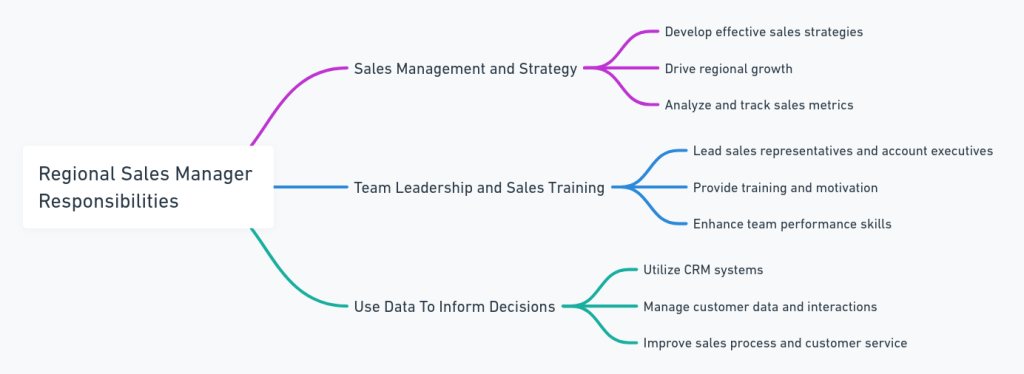Are you trying to understand the differences of a Sales Director vs Regional Sales Manager? We’ve got you covered below. We’ll explain what each role is, their job description, salary, skills, and responsibilities.
What Is a Sales Director?
A Sales Director is typically a senior sales executive, responsible for crafting leadership strategies to guide the sales department. Charged with the development and execution of sales strategies, a Sales Director’s core objectives focus on driving revenue growth and increasing profitability. They are often involved in creating and implementing sales plans aimed at market expansion and enhancing the company’s sales presence.
Ask any sales recruiter, and they will say that this role requires a blend of sales and management acumen. Sales Directors oversee the sales management processes, ensuring alignment with the overarching marketing strategies of the business. In terms of management, they possess the authority to lead sales teams, oversee sales goals, and direct the day-to-day operations in the sales department.
The breadth of a Sales Director’s responsibilities often includes attending high-level meetings to make key decision-making contributions. They serve as the director of sales, setting sales goals aligned with business objectives, forecasting and developing sales plans, and regularly reviewing the sales team’s performance.
When it comes to educational background, candidates for the role usually hold a bachelor’s degree in business administration or a related field. They often bring several years of experience in sales management or a similar area within the industry, exhibiting a proven track record of growth and leadership.
As for compensation, the average salary for a Sales Director varies, with a general salary range reflecting the individual’s expertise, industry, and region. A Sales Director’s salary is typically commensurate with their experience and the level of responsibility this sales role entails.
What Is a Regional Sales Manager?
A Regional Sales Manager is a key figure in a sales organization responsible for overseeing the sales operations within a specific geographic area. They manage sales teams, typically comprising of sales managers and sales reps, who work to achieve sales quotas set by the organization.
They develop and execute regional strategies aiming to increase sales volume and market share. The responsibilities of a Regional Sales Manager include setting sales targets for their region, analyzing market trends, and adjusting tactics to optimize sales efforts. They also focus on identifying opportunities for growth, such as prospecting for new customers and expanding into new market segments.
The regional sales manager must possess strong decision-making skills to navigate the complexities of regional markets and problem-solving abilities to overcome challenges faced by their team. Their role involves a considerable amount of support and motivation to encourage sales reps and managers to meet and exceed sales quotas.
The career path for a Regional Sales Manager could lead to a Regional Sales Director role, which holds broader responsibilities and possibly oversight over multiple regions.
| Skills & Qualities | Description |
|---|---|
| Decision-Making Skills | Ability to make informed choices. |
| Problem-Solving Abilities | Tackling issues within the region. |
| Motivational Aptitude | Encouraging teams to achieve targets. |
| Strategic Planning | Crafting regional sales strategies. |
This role also entails regular interaction with clients to maintain strong relationships, ensuring that the business understands and meets the needs of its customers. They are the lynchpin in ensuring that the regional sales machinery runs effectively and efficiently.
Sales Director Job Description
The Sales Director plays a pivotal role in shaping the sales strategies and driving the achievement of sales goals. They possess strong leadership skills, ensuring the sales team is motivated and well-directed. Their communication skills are top-notch, facilitating clear and effective interactions within the team and with clients.
Key Responsibilities:
- Design and implement comprehensive sales strategies to meet objectives.
- Oversee the administration and management of the sales department.
- Provide training and mentorship to the sales team, enhancing their skills.
- Monitor and analyze data to inform decisions and campaigns.
- Ensure the organization of the team aligns with the company’s vision.

Job Requirements:
- Proven experience in a sales management role.
- Proficient in setting and achieving strategic goals.
- Excellent team management and leadership skills.
Preferred Certifications:
- Sales management certifications.
- Relevant industry-specific qualifications.
Sales Directors ensure effective allocation of resources, both human and material, to drive results. The director’s role also encompasses design and execution of business plans that contribute to long-term sustainability and growth.
Regional Sales Manager Job Description
A Regional Sales Manager helps with scaling an organization’s revenue through strategic management and leadership of the sales team within a specific territory. They oversee sales operations, set goals, and ensure these targets align with the company’s broader objectives.
Key Responsibilities:
- Sales Management and Strategy: Develops and implements effective sales strategies to drive growth within the region, harnessing an analytical approach to forecast and track sales metrics.
- Team Leadership and Sales Training: Provides leadership to sales representatives, account executives, and associates by offering training and motivation. Equips the sales team with the necessary skills to enhance their performance.
- Use Data To Inform Decisions: Utilizes CRM systems to manage customer data and interactions, facilitating a better sales process and improving customer service.

Qualifications:
| Education | Experience | Skills |
|---|---|---|
| Bachelor’s degree | Sales experience | Leadership & Team Management |
| (Business/Marketing) | (Preferably in related field) | Negotiation & Communication |
| Strategic Thinking & Problem-Solving |
Duties Include:
- Traveling to offices or locations within the sales territory to meet goals and foster relationships with clients.
- Collaborating with the marketing department to identify and attract new customers and retain existing account bases.
- Ensuring the sales team is goal-oriented, focusing on customer service excellence and adhering to company regulations.
Work Environment and Other Details:
- This management role typically involves office-based work mixed with travel across the sales territory.
- Regional Sales Managers must balance customer-facing activities with internal management tasks.
Successful candidates exhibit strong interpersonal skills, are educationally grounded in business or marketing, and have a clear grasp of goal-driven sales processes. Advanced problem-solving capabilities and a drive for results are essential.
Sales Director Responsibilities vs Regional Sales Manager Responsibilities
A Sales Director typically holds a pivotal role in shaping the organization’s sales strategy and ensuring that sales targets are met. They oversee the entire sales department, leading the sales team with a focus on long-term growth. Their responsibilities often include:
- Developing sales strategies: Crafting comprehensive plans to drive sales growth and meet or exceed sales quotas.
- Leadership: Guiding and motivating the sales team while fostering an environment that supports customer satisfaction and high performance.
- Interdepartmental coordination: Collaborating with marketing and other departments to align all efforts toward the organization’s objectives.
- Decision-making: Making high-level decisions that affect the sales department and often the organization as a whole.
The Regional Sales Manager, on the other hand, has a more specific focus within the organization:
- Managing regional sales team: Directing sales reps in a particular region, with an emphasis on achieving regional sales targets.
- Tailoring sales strategies: Adjusting corporate sales strategies to fit regional market conditions and customer needs.
- Sales management: Overseeing sales activities within a region, including closely monitoring sales rep performance and regional sales quotas.
- Campaign execution: Implementing sales campaigns and promotional activities in accordance with overall sales objectives.
Both roles are crucial in their own right, with the Sales Director providing broader leadership and the Regional Sales Manager diving into the specifics of regional sales management to increase sales and contribute to the organization’s success.
Regional Sales Manager Salary vs Sales Director Salary
Salary levels for Regional Sales Managers and Sales Directors vary widely, influenced by factors such as age, experience, the size of the organization, and the scope of responsibility. A Regional Sales Manager is typically responsible for overseeing sales activities within a specific geographic area. This role often involves direct interaction with salespersons and account managers to meet targets and implement sales initiatives.
Average Salary:
- The average salary for a Regional Sales Manager in the United States ranges from $70,000 to $120,000 per year.
- Sales Directors, on the other hand, command a higher average salary due to their broader leadership role, generally ranging from $120,000 to $180,000 per year.
Influence of Organizational Size:
- In larger organizations, Sales Directors may have access to larger budgets and resources, reflecting their strategic role in driving profitability and decision-making at the highest level. Their compensation, therefore, is typically at the higher end of the scale.
Experience and Age Considerations:
- Experience and age can impact earning potential. More experienced leaders with a track record of successful decision-making and leadership are at the upper end of the salary range.
Responsibilities:
- A Sales Director’s role extends beyond the regional focus, encompassing the overall sales organization’s success. They are responsible for setting strategic initiatives, managing large budgets, and leading resources to ensure the profitability of the business. These expanded responsibilities justify their higher salary bracket.
In summary, while both positions play crucial roles in the success of a company’s sales efforts, the Sales Director’s position commands a higher salary due to its greater responsibilities and impact on the organization’s overall sales strategy.
Which Job Title is Higher, Sales Director or Regional Sales Manager?
In the hierarchy of sales positions within an organization, Sales Director holds a higher position than a Regional Sales Manager.
The Sales Director is responsible for the overall strategy of the sales department, leadership development, and establishing high-level sales goals for the company. They possess ultimate authority and are part of the executive team, making key decisions that affect the entire organization.
- Authority: Sales Directors have greater decision-making powers and influence the direction and policies of the sales department.
Regional Sales Managers, on the other hand, implement sales strategies within a specific geographical area. Their authority is generally confined to the regions they manage. They focus on meeting sales targets, managing local sales teams, and reporting to higher management.
- Responsibilities: Regional Sales Managers oversee day-to-day sales operations in their assigned area and report to the Sales Director.
Career progression typically advances from managerial roles, such as the Regional Sales Manager, to directorial roles, namely the Sales Director. The step up to Sales Director involves a transition from managing local sales activities to designing organizational sales strategies and overseeing multiple regions or the entire company’s sales force.
- Career Path: Progression from Regional Sales Manager to Sales Director is a common career trajectory.
In summary, a Sales Director has broader responsibilities and higher authority compared to a Regional Sales Manager, reflecting their seniority in the organizational hierarchy. Their role encompasses overarching leadership and management of the company’s sales objectives, strategies, and goals.
Regional Sales Manager and Sales Director Skills Compared
Regional Sales Manager
Regional Sales Managers often focus more on the direct management of a sales team within a specific geographic area. Leadership skills are essential as they motivate and support their team to meet sales objectives.
They typically have strong communication skills to effectively coordinate with their team and address customer service issues. Regional Sales Managers excel in implementing strategies tailored to their local market and have a pivotal role in the sales process, from prospecting to closing deals.
Sales Director
In contrast, a Sales Director usually oversees sales operations on a larger scale, potentially national or international. Their role involves a strategic focus on growth and development of the sales function across wider geographical areas.
Strategy formulation, setting performance metrics, and assessing market trends for the launching of new products or services is a key part of their role. They are often responsible for the larger-scale negotiation with key accounts and play a major part in acquisition efforts.
Compared
Both roles require solid decision-making skills, but a Sales Director may be more involved in high-level decisions that affect the sales direction of the entire organization, whereas Sales Managers are often tasked with tactical, immediate decisions.
To support their sales team, a Regional Sales Manager will often be involved in training and developing the team’s skills. They directly oversee the sales management process and provide assistance to the team by analyzing performance and redefining sales tactics accordingly.
| Regional Sales Manager | Sales Director |
|---|---|
| Implements direct sales strategies. | Creates high-level sales strategies. |
| Manages and supports a local sales team. | Oversees regional and national sales teams. |
| Focuses on customer service and local markets. | Drives overall market growth and expansion. |
| Involves in day-to-day sales activities. | Focuses on long-term goals and sales objectives. |
| Directly trains and develops sales personnel. | Shapes the sales direction and policy. |
Both positions demand a strong set of leadership and communication skills, but they differ greatly in their daily focus and overall responsibilities regarding sales management and strategy.
Sales Director and Regional Sales Manager Overview
| Aspect | Sales Director | Regional Sales Manager |
|---|---|---|
| Focus | Strategic, organizational-wide sales initiatives and goals | Tactical, region-specific sales targets and strategies |
| Authority | Higher, with influence over company’s sales strategy | Limited to a region, with a focus on implementation |
| Leadership | Steering the sales department towards broader objectives | Direct management of a regional sales team |
| Industry Role | Often involved in industry-wide analysis and adaptation | Concentrated on leveraging local market trends |
Both roles require strong leadership and a clear understanding of the company’s vision. However, the Sales Director’s decisions can impact the entire sales department and, ultimately, the company’s direction in the industry, while a Regional Sales Manager’s authority is usually confined to their specific region and sales team. Each sales role is distinct, yet they work in synergy to drive the organization’s sales success.
Final Comparison
The roles of Sales Director and Regional Sales Manager are distinct, each carrying unique responsibilities and areas of focus. The Sales Director oversees the entirety of an organization’s sales department, setting strategy and long-term goals. They make high-level decisions aimed at driving the company’s sales efforts in alignment with the overall business objectives.
Regional Sales Managers, on the other hand, operate within a specified geographic area, executing sales strategies and managing local sales teams to meet regional sales targets. Their focus is more tactical, addressing the day-to-day challenges, adapting to local market conditions, and ensuring their team’s performance aligns with the broader objectives set by the Sales Director.
| Sales Director | Regional Sales Manager |
|---|---|
| Sets overall sales strategy | Implements strategy in specific regions |
| Focuses on long-term goals | Concentrates on short-term targets |
| Manages entire sales department | Oversees local sales teams |
| Aligns sales goals with company objectives | Adapts to regional market conditions |
In the corporate hierarchy, Sales Directors usually hold a more senior position than Regional Sales Managers. Both roles, however, are crucial for the success of a company’s sales operation, and their effectiveness relies on strong communication, collaboration, and an in-depth understanding of the market dynamics and customer needs.
Choosing between these roles for career progression depends on individual strengths, preferences, and professional aspirations. Those aiming for high-level strategic management may aspire to be Sales Directors, while those with a penchant for operational management may find the Regional Sales Manager role more fulfilling.



